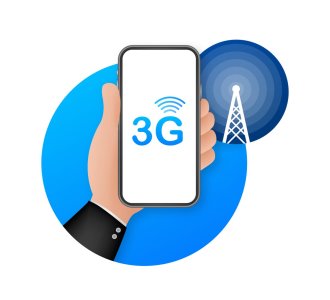Here’s why Australia's top 3 internet providers are ditching 3G
We all know that technology is fast-moving. With new advancements appearing, it can be difficult to keep up with the latest ones out in the market.
However, in this case, users will be forced to keep up with the technology.
The top three internet providers in Australia–Vodafone, Telstra and Optus–are set to phase out their 3G networks starting in December this year.
3G has been the backbone of many of our telecoms since 2001. While newer versions have been rolled out in the past years, there are still those who stuck with this network until now.
That's why Seniors Discount Club is here to explain what you need to do to ensure you won't be caught out without a connection.
Vodafone, Telstra and Optus are phasing out their 3G service between now and early 2024, leaving many with questions:
As technology advances, so too does the speed at which data is transmitted–the 3G network transfers data at a rate of minimum 144 kilobits-per-second (kbit/s), while 4G transfers at 30 megabits-per-second (Mbit/s), and 5G at 50 Mbit/s.
To put it in perspective, 1 Mbit/s is equal to 1000 kbit/s. This makes 4G and 5G leaps faster than 3G.
5G was introduced in 2019 and has since been the 'hottest' network type for mobile phones, tablets and devices.
While many may have migrated to the 5G network by now, there are still an estimated two million to three million Aussie customers using 3G-based devices, mainly composed of the elderly population who rely on them for important everyday tasks, such as medical devices.
Editor & Tech Commentator for EFTM.com, Trevor Long, explains: 'The bigger risk is to people with extremely old phones, which–despite 5G being five years old, and 4G being a decade more than that–don't even connect to 4G.'
If you're worried about your 3G-based phone or device, the best way to find out is to contact the manufacturer directly to ask if it'll still be functional once the networks are switched off.
Vodafone will be the first telco to switch off their 3G network on December 15, followed by Telstra on June 30, 2024, and Optus in September 2024. If you're with these providers and still using a 3G device, here's what to do.
Their page also offers information for customers, including what settings you may need to change, such as moving to 3G or 4G instead of 5G, and alternative devices that'll still work with the network.
You may access Vodafone’s website here.
Telstra has a similar page that explains why they're transitioning from 3G to 5G, saying they 'repurpose' the 850MHz spectrum, currently used to provide 3G coverage, to support their 5G rollout.
You may access Telstra’s website here.
For those customers who require some form of medical device (such as 'man down' dongles in care homes), contacting the device manufacturer will be your best bet.
Mr Long says it's important to take care of who you speak to, explaining that 'people will think this doesn't apply to them because they only got the device five years ago, yet in fact they might be left with a device that simply fails to work.'
Optus is the last to switch off its 3G coverage, but you can still find out more by visiting its page, which also provides options and information for customers who will be affected.
You may access Optus’s website here.
If you're a customer with any of these three internet providers and you're still relying on your 3G device, then now is the best time to start investigating the best way forward.

What do you think of this story, dear members? Are you, or anyone you know, still using a 3G device? Share your thoughts in the comments below!
However, in this case, users will be forced to keep up with the technology.
The top three internet providers in Australia–Vodafone, Telstra and Optus–are set to phase out their 3G networks starting in December this year.
3G has been the backbone of many of our telecoms since 2001. While newer versions have been rolled out in the past years, there are still those who stuck with this network until now.
That's why Seniors Discount Club is here to explain what you need to do to ensure you won't be caught out without a connection.
Vodafone, Telstra and Optus are phasing out their 3G service between now and early 2024, leaving many with questions:
What is 3G?
3G is the abbreviation for 'third-generation mobile phone and data network'. Its name is derived from the third evolution of telecommunications networks–with the original 1G analogue network ageing back to the 1980s.As technology advances, so too does the speed at which data is transmitted–the 3G network transfers data at a rate of minimum 144 kilobits-per-second (kbit/s), while 4G transfers at 30 megabits-per-second (Mbit/s), and 5G at 50 Mbit/s.
To put it in perspective, 1 Mbit/s is equal to 1000 kbit/s. This makes 4G and 5G leaps faster than 3G.
5G was introduced in 2019 and has since been the 'hottest' network type for mobile phones, tablets and devices.
While many may have migrated to the 5G network by now, there are still an estimated two million to three million Aussie customers using 3G-based devices, mainly composed of the elderly population who rely on them for important everyday tasks, such as medical devices.
Editor & Tech Commentator for EFTM.com, Trevor Long, explains: 'The bigger risk is to people with extremely old phones, which–despite 5G being five years old, and 4G being a decade more than that–don't even connect to 4G.'
If you're worried about your 3G-based phone or device, the best way to find out is to contact the manufacturer directly to ask if it'll still be functional once the networks are switched off.
Vodafone will be the first telco to switch off their 3G network on December 15, followed by Telstra on June 30, 2024, and Optus in September 2024. If you're with these providers and still using a 3G device, here's what to do.
How should I prepare for the switch-off?
Vodafone has a page on its website for those affected by the 3G shutdown, which explains that this is not a one-off issue, as similar shutdowns have happened before when the 2G network switched over to 3G.Their page also offers information for customers, including what settings you may need to change, such as moving to 3G or 4G instead of 5G, and alternative devices that'll still work with the network.
You may access Vodafone’s website here.
Telstra has a similar page that explains why they're transitioning from 3G to 5G, saying they 'repurpose' the 850MHz spectrum, currently used to provide 3G coverage, to support their 5G rollout.
You may access Telstra’s website here.
For those customers who require some form of medical device (such as 'man down' dongles in care homes), contacting the device manufacturer will be your best bet.
Mr Long says it's important to take care of who you speak to, explaining that 'people will think this doesn't apply to them because they only got the device five years ago, yet in fact they might be left with a device that simply fails to work.'
Optus is the last to switch off its 3G coverage, but you can still find out more by visiting its page, which also provides options and information for customers who will be affected.
You may access Optus’s website here.
If you're a customer with any of these three internet providers and you're still relying on your 3G device, then now is the best time to start investigating the best way forward.
Key Takeaways
- The 3G mobile phone and data network is set to be shut down in Australia starting in December. Major telcos taking this initiative include Vodafone, Telstra and Optus.
- Those potentially most affected by this shutdown are those using extremely old phones and medical devices that still use the 3G network.
- Telcos like Vodafone, Telstra, and Optus have already communicated to inform customers about the shutdown, advising them to contact the manufacturers of their respective devices for solutions, such as upgrading to a new 5G device.
What do you think of this story, dear members? Are you, or anyone you know, still using a 3G device? Share your thoughts in the comments below!








